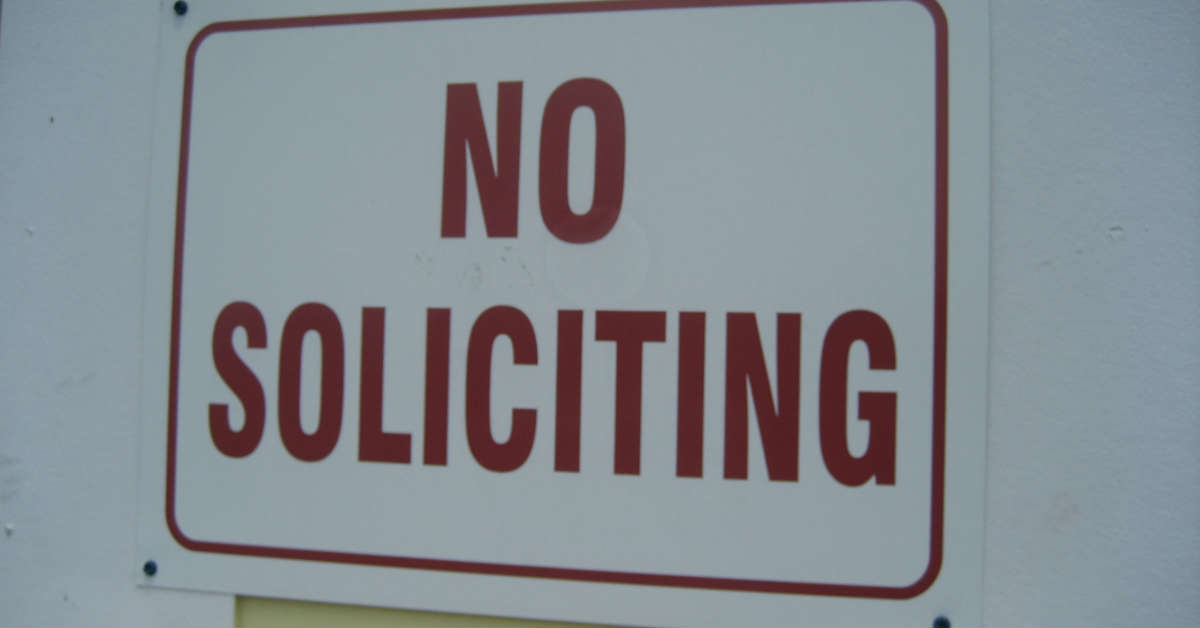He knocked on our door around mid-day on a quiet Saturday—something that almost never happens in our neighborhood.
Thankfully, I had the advantage of being able to see him through the glass panes of our front door. I knew several things about him at once: he wasn’t one of our neighbors or friends (any friends of ours would’ve called first, of course), he was well-groomed and neatly dressed (casual, but put-together), and bore all the outward signs of being a respectable human being.
But… as someone who takes the safety of his family very seriously, I know that outward appearances can be deceiving.
- Does he have “pals” waiting in the bushes just beyond my view?
- Is he a sex offender?
- Is he here to see whether I have kids?
- He can see through the glass panes just like I can… is he here to case the joint? Should I have a weapon when I approach the door?
Mind you… I live in a solidly middle-class suburban neighborhood. It’s not a gated community, so perhaps if he were here with some sort of evil or malicious intent, he might’ve chosen a different neighborhood.
And he might’ve chosen a weekday when we aren’t likely to be home.
But still… there are types (pedophiles, for example) that are looking for homes with kids when everyone is at home so they can see what conditions might be like.
I made sure I knew the whereabouts of everyone in my family, and then I opened the door and stepped partially out onto the stoop.
He greeted me with a warm smile, “Hi, I’m _______, and I’m running for _______”
I’m dropping the name and the exact local office he’s running for to protect the innocent… or guilty, as the case may be.
He offered me a flyer or brochure, I’m not sure which, because I wasn’t looking at it. My eyes were 100% on him… still trying to accurately assess the situation.
I cut him off mid-sentence. “Did you see the ‘No Soliciting’ sign at the entrance of the neighborhood?”
“Oh no… I didn’t notice that,” he said, almost sheepishly.
Maybe he did… maybe he didn’t. I’m not sure.
I proceeded to let him know that the sign is legally posted at the entrance to the subdivision and that we have it there for a reason.
The rest of the conversation was pretty brief. I don’t think I was rude to him, although I might’ve been. I certainly didn’t take the flyer he was offering.
Good Hustle, My Friend
Look… I appreciate the challenges that candidates for local office face. It’s hard to get the word out about your candidacy, your beliefs, your strengths, and all the other reasons why you believe you should be elected.
And I’ve gotta tell you, I truly respect the effort and the chutzpah that it takes to go door to door and introduce yourself to voters.
I’ve done plenty of cold-calling in my life… for business, for charitable work, for… you name it—face to face, on the phone, and even online.
Any time you approach an unwilling subject and interrupt their life, you know you’re going to get every kind of reaction known to mankind. And most of them will reject you. My hat is off to anyone who knowingly faces that and goes for it anyway.
Seriously… respect, my friend.
Were I in some sort of advisory role for a candidate like him (which I am not, for the record… not at the moment, at least), I might even suggest that door-to-door solicitation would be a smart move. It puts you in front of the voters, lets them see your face, look you in the eye, shake your hand, and hear from you—straight from the horse’s mouth—why you’re running and what you have to offer.
I mean… even if the voters don’t agree with your positions, you will benefit from a simple human dynamic that we know makes a difference on election day: people vote for candidates with which they are familiar.
This guy was a nice enough guy… at least as much as I could gather from the 20-second conversation we had as I eyed him warily on my front porch.
And he was smart enough to walk straight down my driveway, get into his vehicle (yes, I noted the make, model & color—not that I really needed to… after all, he introduced himself by name), and drive right out of the neighborhood.
I looked him up after he left. He’s a family man. He’s got to understand the difficulties faced by someone like me who wonders exactly who it is that has marched right up to my front door.
But all of those factors that are in his favor can’t overcome one simple fact: any subdivision with a “No Soliciting” sign is off limits.
The sign serves as legal notice, so any law enforcement officer (or judge, if it got that far) would not accept the “I didn’t notice it” excuse.
If you’re going door-to-door, it is incumbent upon you to know whether you’re legally allowed to solicit in that neighborhood or not.
“Well I’m Not Selling Anything”
Fair enough. There are specific Florida statutes (501.022, for example), that regulate the behavior of commercial solicitors.
I’m not an attorney, and I haven’t researched any case law where political candidates are concerned. So… I could be wrong about the specific legality of the actions of my unnamed new friend.
However, there are also Florida statutes (102.031, for example) that regulate the behavior of people involved in conducting elections, and that particular subchapter specifically uses the term “solicit” to refer to the action of “soliciting” votes (although it specifically deals with actions that occur at polling places).
So… our “No Soliciting” sign could clearly be construed to apply to people soliciting votes. We don’t, after all, specify the type & nature of the solicitation.
Regardless of whether or not a Court would find that a political candidate soliciting votes had violated the law by ignoring a “No Soliciting” sign, the voters themselves might find it pretty easy to believe that the candidate had broken the law.
And after all… do you want to vote for someone who ignores the law (or at the very least, your stated wishes) in the very act of soliciting your vote?
I don’t think so.
For the record: I may or not find myself casting a vote for this guy on election day. It remains to be seen. I haven’t evaluated him nor his opponent(s), as of yet.
As for the matter of him coming to my door? I’m going to withhold judgment on that particular issue as I’m inclined to give him the benefit of the doubt over whether he actually saw the sign or not. For now. Especially since he did the right thing and immediately left the neighborhood after we spoke.
But if you’re a candidate for office, you would certainly do well to notice the signs at the entrance of any subdivision you enter. Others might not be so kind.
Photo: Marcus Quigmire via Flickr (CC BY 2.0)


According to the First Amendment and a 2002 Supreme Court decision, soliciting and campaigning are different things.
That’s in keeping with a 2002 decision where the Supreme Court found that the U.S. Constitution protects the rights of missionaries, politicians and activists to knock on your door and offer to tell you what they believe or why you should vote for them or care about their cause.
In Watchtower Bible & Tract Society of New York, Inc. v. Village of Stratton, the case was brought against the tiny town of Stratton, Ohio, for requiring that Jehovah’s Witnesses register with officials before knocking on doors. A diverse group of allies, from The Church of Jesus Christ of Latter-day Saints to Gun Owners of America to the American Civil Liberties Union, all signed onto the missionaries’ side.
The court smacked the law down by a decisive 8 to 1 vote. Conclusion: The First Amendment guarantees your right to take a message — but not a sales pitch — directly to someone’s door, regardless of a no solicitation sign.
Interesting. Thanks for your comment, John.
As I mentioned in the post, I didn’t research the specific case law around candidates for office. I still haven’t, although armed with what you shared here, I might.
That said, the question still remains as to whether or not the candidate should go door-to-door in a neighborhood with a posted sign. What is strictly legal and what may leave a favorable impression on voters are two different things. Certainly, if a candidate didn’t care about leaving a negative impression on voters, that candidate could do what is within his or her rights to do. But then it’s a coin toss as to whether that candidate will gain or lose.
I’ve canvassed for other candidates and this year I am a candidate.
If I see a no soliciting sign on the front door, I leave literature but I don’t knock. I see this as the same as if I mailed them something, and the sign might be there because they are a 2nd or 3rd shifter. It’s the polite thing to do.
If there is a no soliciting sign at the entrance of the subdivision, I ignore it, as does the USPS mail delivery person delivering advertisements and political ads to your mailbox.
As long as I am not trying to sell you something, I am not soliciting. If I am merely advertising myself and my cause that’s a completely separate thing. I don’t even take donations while canvassing just to make that line crystal clear.
Hey Tom, I admire your enthusiasm and willingness to help candidates you believe in. Since writing this article, it’s come to my attention that different jurisdictions have different rules about political activities, so your mileage may vary in different areas.
That said, trespassing on my property in violation of a “No Soliciting” sign is a very different thing than a U.S. Postal Service employee delivering mail to USPS property. And even if they were the same thing, breaking the law because others do so with impunity is a lousy justification.
I find it humorous that you’ll respond differently to a “No Soliciting” sign on someone’s front door than you do to the one at the entrance to the neighborhood. I don’t need a sign on my front door because in Florida where I am, the one at the neighborhood serves as legal notice.
And we’re going to disagree about the distinction you’re making with regard to soliciting. To solicit doesn’t require selling anything or accepting donations at all.
Your point of view caught my eye and was very interesting. Thanks. I have a question for you.